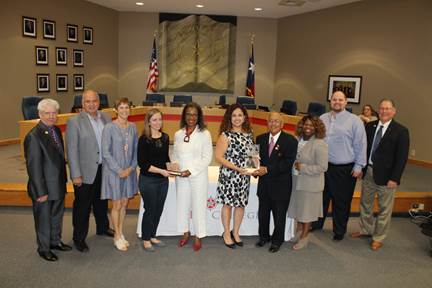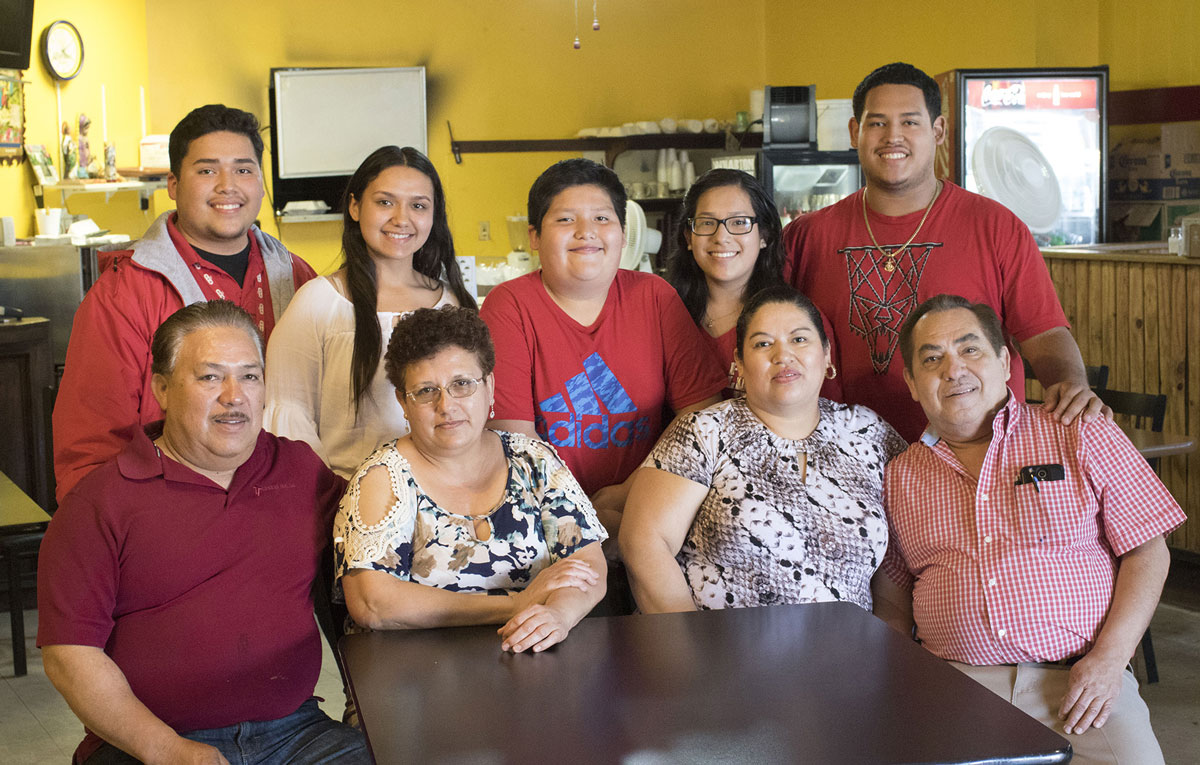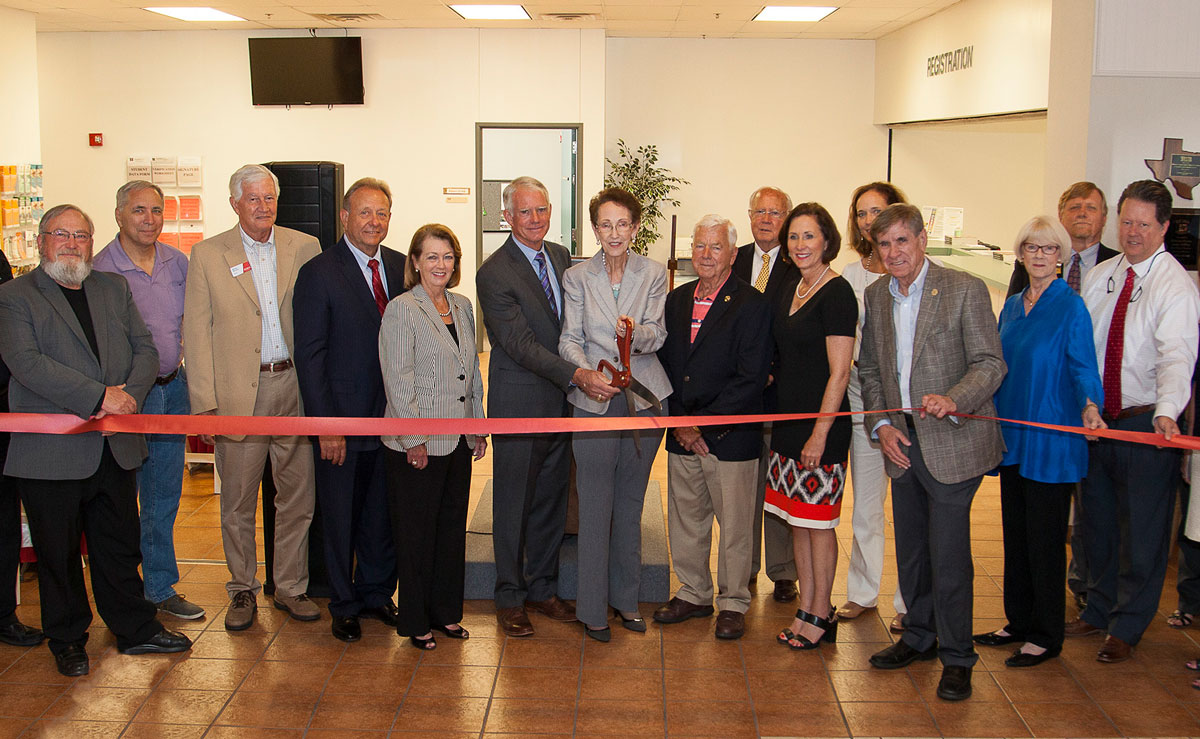AACC honors Lee College for diversity efforts

Dr. Dennis Brown, Lee College President; Mark Himsel, Lee College Regent; Judy Jirrels, Lee College Board of Regents, Secretary; Jessica Falla, Lee College HSI STEM Grant Success Coach; Susan Moore-Fontenot, Lee College Regent; Victoria Marron, Lee College Executive Directory HSI Initiatives; Pete Alfaro, Lee College Board of Regents, Chair; Gina Guillory, Lee College Regent; Michael Pounds, Lee College HSI STEM Grant College Completion & Transfer Coach; Gilbert Santana, Lee College Regent.
When Lee College was recognized this week with the American Association of Community Colleges’ Award of Excellence in the category of Advancing Diversity, the honor reflected innovative work by people and departments across campus.
In announcing the award, Lee College President Dennis Brown said, “This recognition is a testament to the tremendous work being done by our faculty and staff in creating a culture that empowers our diverse student population to thrive, succeed and realize successful futures — whether they choose to continue their education or move on to rewarding careers.”
The American Association of Community Colleges (AACC) is the primary advocacy organization for the nation’s community colleges. The association represents nearly 1,200 two-year, associate’s degree-granting institutions and more than 12 million students. “Winning in a category or being identified as a finalist for a category is always a huge honor,” says Brown. “For any institution, it’s like the Academy Awards for community colleges.”
Joining Brown in receiving the award were Lee College’s Executive Director of Hispanic Serving Institution Initiatives Victoria Marron, Executive Vice President Dr. Christina Ponce and Vice President of Workforce and Corporate Partnerships Dr. Angela Oriano.
Victoria Marron said the efforts to improve the college experience for historically under-served populations benefits all students.
“We’re really trying to plan for the future growth, not just of our community, but of the college and addressing our growing Hispanic population is important for us as a college,” she said.
“We’ve been very blessed in having several different grant awards, and by centralizing those awards it allows us to work collaboratively across Lee to help all students.”
A prime example, Marron said, is the STEM lab, which is open to all students. “When the grant was written, because it comes from the Hispanic Serving Institutions department in the Department of Education, they’re expecting certain measurements and certain other activities to target low-income and Hispanic students.”
In making the award, the AACC statement said, “Lee College has taken a strategic, proactive approach to addressing inequities hindering the persistence of its under-served students, especially the growing Latino population.
“With a grant from the U.S. Department of Education Hispanic Serving Institution division, coupled with other funding sources, the college established a centralized Hispanic Serving Institution Initiatives Department.
“The HSI Initiatives Department allows the college to provide students with a centralized hub to take advantage of academic support,” the statement continued.
“The college has targeted communities with the lowest college-going rates by taking its Mobile Go Center, which includes a wide array of resources, directly to families. Lee College also has offered city-wide STEM recruiting activities.”
Marron said, “What set us apart is that we took a really proactive approach to planning for the future.”
One of the innovative programs Lee has implemented is Weekend College which enables people who are working full-time to attain an associates degree or technical certification in 24 months or less by attending class on Friday evenings and Saturdays.
Marron said, “One of the things we’ve learned over the last six years is really how to leverage different grant funds with high-impact best practices. That formula is really making a difference. As a result, for example, we were able to develop a plan and write a successful grant application for our First in The World Grant, which in turn helped us develop our Weekend College.”
Lee College’s Weekend College has achieved a three-year graduation rate of 70 percent, far exceeding the 20 percent three-year graduation rate for Texas community college students overall.
The First in the World grant requires research comparing student outcomes in the grant-funded program with similar students in traditional programs. Marron said the Weekend College students have shown higher GPAs and higher graduation rates in that research.
“Much of this success can be attributed to the pathways we created that laid their whole degree plan out for them. They knew what they were taking every single term. And they were assured that wouldn’t change. We coupled that with intensive support from a college completion coach.”
Marron said the Lee College designation as a Hispanic Serving Institution is through the U.S. Department of Education. Criteria include that at least 25 percent of full-time students are Hispanic and that the institution’s students are eligible to receive Pell grants.
The designation makes the college eligible for some additional funding sources and requires an effort to streamline and improve services.
“When you can target and provide assistance to your under-served populations, you are providing services to all students,” Marron said. “That’s the beauty of this kind of scalability of practice and resources.”
“Advancing diversity doesn’t mean that we’re saying we’re as diverse across campus as we need to be, rather we’re advancing to the point of where we’re going to be.
“We got an award and we’re incredibly grateful for it, but this is just the beginning.”
Lee College was also a finalist in the award for College and Corporate Partnership. Joining Brown in receiving that finalist award were Bob Cautadal, manager of the ExxonMobil Chemical Plant, and Connie Tilton of the ExxonMobil Public Affairs Office.
Lee College has been honored by AACC multiple times in recent years — in 2017 as an AACC Award of Excellence Finalist for Advancing Diversity, Faculty Innovation and Outstanding College/Corporate Partnership. In 2016 as an AACC Award of Excellence Finalist for Faculty Innovation, Exemplary Board/CEO and Outstanding College/Corporate Partnership, and in 2015 as an AACC Award of Excellence Winner for Student Success as well as an AACC Award Finalist for Exemplary Board/CEO.
Lee College offers more than 100 associate degree and certificate programs, as well as non-credit workforce and community education courses, that prepare its diverse student body for advanced higher education; successful entry into the workforce; and a variety of in-demand careers. With the main campus and McNair Center located in Baytown, Texas, and a satellite center in nearby Liberty, the college serves a geographic area of more than 220,000 residents that includes 13 independent school districts. To learn more, visit www.lee.edu.
Originally Posted on leecollegenews.com


